|
||||||||||||||||||||||||||||||||||||||||||||||||||||||||||||||||||||||||||||||||||||||||||
|
Melchizedek;
priest of the most high G-d!
Melchizedek king of Salem [later called
Jerusalem] brought out bread and wine [for their nourishment]; he
was the priest of G-d Most High, And he blessed him and said,
Blessed (favored with blessings, made blissful, joyful) be Abram by
G-d Most High, Possessor {and} Maker of Heaven and earth, And
blessed, praised, {and} glorified be G-d Most High, Who has given
your foes into your hand! And [Abram] gave him a tenth of all
[he had taken]. And the king of Sodom said to Abram, Give me
the persons and keep the goods for yourself. But Abram said to the
king of Sodom, I have lifted up my hand {and} sworn to the
L-rd, G-d Most High, the Possessor {and} Maker of Heaven and earth,
(Genesis 14:18-22)
Who was
Melchizedek? He
was obviously a G-d-fearing man, for his name means “king
of righteousness,” and "king of Salem" means “king of
peace.” He was a “priest of G-d Most High”
(Hebrews 7:1-2). He recognized G-d as Creator of heaven and earth. What else is
known about him? Four main theories have been suggested:
|
||||||||||||||||||||||||||||||||||||||||||||||||||||||||||||||||||||||||||||||||||||||||||
|
(1)
Melchizedek was a
respected king of that region (Salem). Abram was simply showing him
the respect he deserved.
Melchizedek;
priest of the most high G-d,
Genesis 14:18,
was
Shem,
Noah’s
Oldest son. Genesis 10:21,
Shem was the `Rabbinical’ teacher of Eber’s family; origin of the
spiritual use of the term, “Hebrew”, soon after the confusion
of languages at the Tower of Babel.
Shem developed
a school, then a city which gained the reputation of “Salem”,
city of Peace. (Became later Yerushalaim / Jerusalem)
This ‘New Birth”
experience was not limited to any family; Moses found a wife amongst
the daughters of the
“Priest of Midian”
who was a
Hebrew,
a great great grandson of Abraham’s
2nd wife,
Ketura, by
one of her many sons, Midian.
Jethro, Moses’
father-in-law, was also called, Reuel.
Exodus
2:18 & 3:1,
meaning, ”His Excellency”!
Shem lived
500 years after the Flood.
Shem became
King of "Salem" just before
Noah
died. Eber outlived
Abraham,
(Genesis 11:16,
17)
Abraham lived 175 years; his father, Terah lived 265 years!
(Genesis 11 &
12; 25:7)
Linguistics Hebrew
was the language of Abraham’s father, and above mentioned Patriarchs
who were still living. Descendants of
Shem are called “Semites”.
Semites who obtained a personal relationship with the Heavenly
Father and His Holy Spirit
Angels are called, `Hebrews.’!
Several Bible teachers think there were over 2 billion people on the
Earth before the Flood, and many tribal languages besides the
original spoken by Adam & Eve, &
developed literatures, which
Noah
brought on the
Ark.
Shem
and
Noah
spoke Hebrew,
{An ancient
form} amongst other languages.
Prophecy was not limited to the Hebrews. The eyes of the L-rd run to and
fro throughout the whole Earth, to show Himself strong on
behalf of him who is right with G-d. So, it is likely that
Noah had writings and maps on the Ark!
Reconciliation / Priesthood / Individual, Personal responsibility to
make things right with G-d.
Genesis 4:7
- G-d spoke directly with Cain before the Flood, and told him
that he shall rule over the
devil {sin}.
Yeshua/ Jesus Christ
told His Disciples they would receive power over all
the power of the enemy!
As
tribes grew into nations the rulers had to make sacrifices to the
“Higher Powers”, thereby
acting as religious leaders and priests. When the citizens hear and
obey the voice of G-d, they will demand that the king be righteous.
Melchizedek means king of
righteousness.
Yeshua/ Jesus
the Christ
was fore- ordained to rule the world as King of Kings; this
is His inheritance from the Creator for dying to take away the
sin/guilt
of all G-d’s fallen and rebellious
servants.
G-d was in
Yeshua/ Jesus
Christ reconciling the world unto
Himself. The rebellious Angels are on probation until the Great White Throne
judgment.
(Revelation)
In
the New Testament, the religious group called `Sadducees’ considered
themselves to be `just’ and `right’ because they kept the physical liturgy of the religion; but they were `materialists’
and failed to recognize the moving of the Spirit of G-d in mercy and compassion! The phrase, “Spirit
of G-d” could refer to any person in the G-d-head, or to any chosen
Angel on assignment from G-d, or even to the neuter gender {in
Greek} of precise force to work at G-d’s command. |
||||||||||||||||||||||||||||||||||||||||||||||||||||||||||||||||||||||||||||||||||||||||||
|
Over
the millennia, there have been different names for Jerusalem in
different languages.
Several Jewish midrashim say that "Jerusalem has
70 names". Lists have been compiled of 72 different
Hebrew names for Jerusalem in Jewish Scripture
Scriptural Hebrew
ירושלם
Yerushalaim
probably "Heritage
of Shalem" or "Heritage
of the Complete"
In the Book of Genesis, Salem or Shalem
is the name of the place of which
Melchizedek
is king.
Genesis 14:18 has
מלכי־צדק מלך שלם ... כהן
לאל עליון׃ The KJV
renders this as "Melchizedek
king of Salem ... the priest of the most high G-D (El
Elyon)." The Hebrew root
שלם
š-l-m means "whole,
complete" in the idiomatic sense of "at peace".
That the name
Salem refers to Jerusalem is evidenced by
Psalms 76:2 which uses
"Salem" as a parallel for "Zion", the citadel of Jerusalem.
Similarly the writer of the Epistle to the Hebrews equates
Salem with Jerusalem and the same identification is made by Josephus
and the Aramaic Targums.
In the Amarna letters,
Urušalim is used
for Jerusalem and is
recognized as being a cognate of Hebrew
Ir Shalem -
city of Salem |
||||||||||||||||||||||||||||||||||||||||||||||||||||||||||||||||||||||||||||||||||||||||||
|
The first
mention of the city of Jerusalem
The first mention of the city of Jerusalem is in the Egyptian Execration Texts of the 19th–18th centuries B.C.E. The name is spelled wš mm and was probably pronounced "rushalimum." In the Tell el-Amarna letters of the 14th century B.C.E., it is written Urusalim, and in Assyrian Ursalimmu (Sennacherib inscription). In the Bible it is usually spelled yrushlm and sometimes yrushlym (pronounced "Yerushalayim").
The city of Salem
(Genesis14:18; Psalms 76:3) is evidently Jerusalem. The Greek Hierosolyma reflects
the "Holiness" (hieros, "Holy") of the city. It seems that
the original name was Irusalem, and the meaning of the two
words composing it is "to found". The popular later midrashic
explanation of the name Jerusalem as "foundation of peace (shalom)"
is associated with the poetic appellations given to the city.
This city is mentioned
809 times in
Scripture
by this name, beginning with
Joshua 10:1
and ending with
Galatians 4:25. It is G-d's chosen place for the capital of His eternal earthly kingdom under the Messiah! (2Chr. 6:6; 33:4; Isa. 2:1-4; 9:6-7; 44:26; 62:7; Jer. 17:25; Ezek. 43:7; 48:35; Joel 3:20; Zech. 14:1-21). Jerusalem will be the center of the battle of Armageddon (Zechariah 14; Revelation 19). Source: Dake's Annotated Reference Bible. |
||||||||||||||||||||||||||||||||||||||||||||||||||||||||||||||||||||||||||||||||||||||||||
|
Melchizedek
or Malki
Tzedek (from Hebrew מַלְכִּי־צֶדֶק
mal -i
édeq,
literally "my king is righteous(ness)") is a priest mentioned during
the Abram narrative in the
14th chapter of the Book
of Genesis.
He is introduced as the
king of Salem, and priest of El Elyon ("The
highest G-d"). He brings out bread and wine and blesses Abram. Chazalic literature, specifically Targum Jonathan, Targum
Yerushalmi, and the Babylonian Talmud, presents the name
(מלכי־צדק)
as a nickname
title for Shem,
the son of
Noah
Shem
(Hebrew: שם,
Modern
Shem Tiberian
Šēm
;
Greek:
Σημ
S
m;
Arabic: سام
Sām; Ge'ez:
ሴም, Sēm;
"renown; prosperity; name")
was one of the sons of Noah in the Hebrew Bible as well as in Islamic literature. He is most
popularly regarded as the eldest son, though some traditions regard
him as the second son.
[Shem,
Ham, and Japheth] Shem,
the middle son, is always mentioned first because
it was through him that the Messiah
should come. Japheth was the oldest (Genesis 10:21; 1Chronicles 1:5) and Ham the youngest
(Genesis 9:22-24).
Genesis 10:21 refers to relative ages of Shem and his brother Japheth, but with sufficient ambiguity in each to have yielded different translations. The verse is translated in the KJV as "Unto Shem also, the father of all the children of Eber, the brother of Japheth the elder, even to him were children born.".
Genesis 11:10 records that
Shem was still
100 years old at the birth of Arpachshad, (but nearly 101 - see
Chronology note,) two years
after the flood, making him barely
99 at the time the flood
began; and that he lived for
another 500 years after this, making
his age at death 600 years!
The children of Shem; five sons: Elam, Asshur, Arpachshad, Lud and Aram, in addition to daughters. Abraham, the patriarch of the Hebrews and Arabs, was one of the descendants of Arpachshad; so also from Shem & Noah! According to some Jewish traditions (e.g., B. Talmud Nedarim 32b; Genesis Rabbah 46:7; Genesis Rabbah 56:10; Leviticus Rabbah 25:6; Numbers Rabbah 4:8.), Shem is believed to have been Melchizedek, King of Salem whom Abraham is recorded to have met after the battle of the four kings!
In
a few of the many extra-biblical sources that describe him, Shem
is also credited with killing
Nimrod,
son of Cush. Shem is mentioned in
Genesis 5:32, 6:10; 7:13; 9:18,23,26-27; 10; 11:10;
also in
1 Chronicles 1:4.
The 1st century historian
Flavius Josephus, among many others, recounted the tradition
that these five sons were the progenitors of the nations
of Elam, Assyria, Syria, Chaldea, and
Lydia, respectively.
Patriarchal rule...
And
Noah was five
hundred years old: and
Noah begat
Shem, Ham, and Japheth.
(Genesis 5:32) The government was patriarchal, meaning that the oldest mail was
the ruler of the family or tribe and the 'Priest' of the household
and the people. Patriarchy is the rules of the (ancient) fathers!
Melchizedek king of Salem; Priest of G-d the Most High; he blessed Abraham... And Melchizedek king of Salem brought forth bread and wine; and he was priest of G-d the Most High. And he blessed him, and said: 'Blessed be Abram of G-d Most High, Maker of Heaven and earth; and blessed be G-d the Most High, who hath delivered thine enemies into thy hand.' And he gave him a tenth of all. And the king of Sodom said unto Abram: 'Give me the persons, and take the goods to thyself.' And Abram said to the king of Sodom: 'I have lifted up my hand unto HaShem, G-d Most High, Maker of Heaven and earth, that I will not take a thread nor a shoe-latchet nor aught that is thine, lest thou shouldest say: I have made Abram rich; save only that which the young men have eaten, and the portion of the men which went with me, Aner, Eshcol, and Mamre, let them take their portion.' (Genesis 14:18-24)
Noah was an old man of over 800
years
when
he cursed Ham’s
descendants, Genesis 9:25-27, and prophesied the rule over the earth’s
inhabitants
to
Shem. Maybe Japheth’s children aided
Ham’s children
in building the
Tower of Babel? The 11th
chapter of
Genesis shows the
lineage from
Shem to Abraham
who was born
while
Noah was still alive. So,
Abraham knew the
original
language
{Hebrew) of
Noah. Six generations
from Abraham to
Moses.
Ten
generations from
Noah to Abraham. G-d
wrote the
Decalogue in
Hebrew.
Yeshua
confirmed the accuracy of the copies
in His day; and
the Dead Sea
Scrolls verify
our copies to be
the same!
Normally, in a spiritually healthy family, the oldest son
receives the
duty of
priesthood, and
so the
grandchildren of
Noah are mentioned, beginning with the family of Japheth,
Genesis 10:2 although the oldest son, Japheth is not
mentioned first
in the previous
verse. |
||||||||||||||||||||||||||||||||||||||||||||||||||||||||||||||||||||||||||||||||||||||||||
|
The priesthood
of Shem to
Abraham...
Malchizedek,
whom Sages
indentify as
Shem, son of
Noah. He was
called
Malchizedek
because he was
the king of the
"future site" of
the Temple the
home of
righteousness.
As the most
honered as
Noah's children,
Shem was made
priest of G-d in
Jerusalem (Ramban)
The Sage derive
that Malchizedek
did not pass on
the priesthood
to his {direct}
heirs; it was
stripped from
him and given to
{his 10th
generation [from
Noah] (Nedarim
32b); heir}
Abraham. Even
tough Abraham
himself was a
descendant, of
Malchizedek
i.e., Shem, he
won the
priesthood
through personal
merit, not
through
inheritance
(Ran, Ibid)
Source:
The Chumash:
The Stone
Edition, Full
Size (ArtScroll)
(English and
Hebrew Edition)
The Torah:
Haftaros and
Five Megillos
with a
Commentary
Anthologized
from the
Rabbinic
Writings
Hardcover – June
1, 1993 XXVI
(Bereishis/Genesis
14:18,19
commentary) |
||||||||||||||||||||||||||||||||||||||||||||||||||||||||||||||||||||||||||||||||||||||||||
|
The seventy
Nation from
Japeth - Ham -
Shem Source: The Chumash: The Stone Edition |
||||||||||||||||||||||||||||||||||||||||||||||||||||||||||||||||||||||||||||||||||||||||||
|
||||||||||||||||||||||||||||||||||||||||||||||||||||||||||||||||||||||||||||||||||||||||||
|
Mount Moriah... |
||||||||||||||||||||||||||||||||||||||||||||||||||||||||||||||||||||||||||||||||||||||||||
|
Mount Moriah
Moriah Area -
The Hebrew name
used for the
archeological
area visible
today known in
Arabic as "Haram
As-Sharif' and
whose average
measurements are
300 by 500
meters.
Jeru-salem...
Even prior to
the conquest of
the city of
Jebus - which
became the City
of David,
(1 Chronicles
11:4)
- we know of the
existence of
Jerusalem from
the record of
Abraham's visit
to
Melchizedek
there, recorded
in
Genesis Chapter 14.
Although the
original
inhabitants were
descendants of
Noah's
son Caanan,
Melchizedek was
both a priest
and a king of
"God Most High,"
in Jerusalem
about 4
millennia ago.
Melchizedek
(his name means
"king of
righteousness")
was a man to
whom Abraham
paid tithes, and
he is a "type"
of
Yeshua/Jesus
Christ
as the
believer's Great
High Priest,
(Psalm 110:4,
Hebrews 5-7).
Jewish connection
Jewish
connection
and veneration
to the site
stems from the
fact that it
contains the
Foundation Stone
which, according
to the
Talmud,
was the spot
from where the
world was
created and
expanded into
its current
form. It was
subsequently the
Holy of Holies
of the Temple,
the Most Holy
Place in Judaism.
Jewish
tradition names
it as the
location for a
number of
important events
which occurred
in the Bible,
including the
Binding of
Isaac, Jacob's
dream, and the
prayer of Isaac
and Rebekah.
Similarly, when
the Bible
recounts that
King David
purchased a
threshing floor
owned by Araunah
the Jebusite,
tradition
locates it as
being on this
mount
Abraham's
sacrifice
The
site of
Abraham's
intended
sacrifice,
and the mountain
on which the
Temple of
Jerusalem was
built.
The best-known
tradition
related to Mount Moriah
is
the binding of Isaac for sacrifice by his father Abraham, related in
(Genesis 22:3-10).
Abraham's meeting with Melchizedek
In
the course of
time the
mountain had
acquired an aura
of sanctity and
he subject of
many traditions.
Indeed, its
sacred status
may date back to
the early
Canaanite
period, when it
perhaps was the
cultic center of
"El Elyon," G-d
of Melchizedek,
king of Salem:
"And Melchizedek, king of Salem, brought out bread and wine;
he was
a priest of G-d
Most High [=El Elyon]. He
blessed him,
saying, Blessed
be Abram of G-d
Most High,
creator of
Heaven and
earth" (Genesis
14:18).
Jacob's
Dream"
The tradition of
"Jacob's
Dream" is
also identified
with Mount
Moriah: "He
came upon a
certain place
and stopped
there for the
night, for the
sun had set.
Taking one of
the stones of
that place, he
put it under his
head and lay
down in that
place. He had a
dream; a stairway was set
on the ground
and its top
reached to the
sky, and angels
of G-d were
going up and
down on it.
And the Lord was
standing beside
him... Jacob
awoke from his
sleep and said,
... "How
awesome is this
place! This is
none other than
the abode of G-d
and that is the
gateway to
Heaven"
(Genesis
28:10-18).
Two Jewish Temples; a Third and Final Temple
Ancient Temple in Jerusalem.
The Temple Mount
is a religious
site in the Old
City of
Jerusalem.
According to
Jewish
tradition, it
was from here
that the world
expanded into
its present form
and from where
G--d gathered the
dust used to
create the first
man, Adam. It
was the place
G-d chose to
"dwell", hence
the construction
of two Jewish
Temples at the
site.
Traditionally,
it is believed
that a Third and
final Temple
will also be
located here.
The Mount is
considered the
holiest site in
Judaism and due
to this, many
Jews will not
set foot on the
Mount itself.
Solomon's Temple
City of David
The Jebusite
"Zion" was
situated on the
southern slope
of Mount Moriah,
above the Gihon
Spring. After
King David
captured the
city he made it
his capital and
named it for
himself: the "City of David."
Foundation Stone
This is perhaps
the most
colorful
representation
of the essential
nature of the
site which some
would later
claim was the
"navel of the
world". At
the summit of
Mount Moriah,
traditionally,
is the "Foundation
Stone," the
symbolic
fundament of the
world's
creation, and
reputedly the
site of the
Temple's Holy of
Holies, the
supreme
embodiment of
the relationship
between G-d and
the people of
Israel. Upon the
completion of
King
Psalms Chapter 110
A Psalm of David. HaShem saith unto my lord: 'Sit thou at My right
hand, until I
make thine
enemies
thy footstool.'
The rod of Thy
strength HaShem
will send out of
Zion: 'Rule thou
in the midst of
thine
enemies.'
Thy people offer
themselves
willingly in the
day of thy
warfare; in
adornments of
holiness, from
the womb of the
dawn, thine is
the dew of thy
youth. HaShem
hath sworn, and
will not repent:
'Thou art a
priest for ever
after the manner
of
Melchizedek.'
The L-rd at thy
right hand doth
crush kings in
the day of His
wrath. He will
judge among the
nations; He
filleth it with
the dead bodies,
He crusheth the
head over a wide
land. He will
drink of the
brook in the
way; therefore
will he lift up
the head.
|
||||||||||||||||||||||||||||||||||||||||||||||||||||||||||||||||||||||||||||||||||||||||||
|
The altars from
generations on
Mount Moriah...
(Rambam [Hil.
Beis
HaBechirah 2:2])
comments: There
was a traditions
that the altars
of David &
Solomon, of
Abraham {where
he bound Isaac,
Genesis 22:2}
of Noah, of
Cain, and Abel,
and of Adam were
all at the same
place: Mount
Moriah; the site
of the Temple in
Jerusalem.
Source:
The Chumash:
The Stone
Edition, Full
Size (ArtScroll)
(English and
Hebrew Edition)
The Torah:
Haftaros and
Five Megillos
with a
Commentary
Anthologized
from the
Rabbinic
Writings
Hardcover – June
1, 1993 XXVI
(Bereishis/Genesis
8:20 commentary) |
||||||||||||||||||||||||||||||||||||||||||||||||||||||||||||||||||||||||||||||||||||||||||
 Temple's Holy of Holies, the supreme embodiment of the relationship between G-D and the people of Israel. Behind the veil, the Holy of Holiest with the Ark of the covenant! |
||||||||||||||||||||||||||||||||||||||||||||||||||||||||||||||||||||||||||||||||||||||||||
|
Having therefore, brethren, boldness to enter into the holiest by the blood of Jesus; by a new and living way, which he hath consecrated for us, through the veil, that is to say, His flesh; And having an High priest over the house of G-D; (Hebrews 10:19-21) |
||||||||||||||||||||||||||||||||||||||||||||||||||||||||||||||||||||||||||||||||||||||||||
|
Many unscriptural interpretations have been given about Melchizedek; but the simple facts of the Scripture give a clear understanding. The person, order and duration of the Melchizedek and Aaronic priesthoods are contrasted. In His sacrificial work Yeshua Messiah/Christ followed the Aaronic which was merely the shadow of His sacrifice (Hebrews 8:1 -- 10:19).
Melchizedek typifies
Yeshua Messiah/Christ in seven ways:
1.
Genealogy
(Hebrews 7:3,6
compared with Micah 5:2)
14:18 Melchizedek—This victory conferred a public benefit on that part of the country; and Abram, on his return, was treated with high respect and consideration, particularly by the king of Sodom and by Melchizedek, who seems to have been one of the few native princes, if not the only one, who knew and worshiped “the most high G-d,” whom Abram served. Salem, Melchizedek’s city, is thought to have been Jerusalem (cf. Psalms76:2). This king, who was a type of the Savior/Messiah (Hebrews 7:1), came to bless God for the victory which had been won, and in the name of G-d to bless Abram, by whose arms it had been achieved—a pious acknowledgement which we should imitate on succeeding in any lawful enterprise.
14:19-20—Verses 14:19,
a constitute a blessing on Abraham by the
priest-king. he gave him
tithes of all—Here is an evidence of Abram’s piety, as well as of his
valor, for it was to a priest or
official
mediator between
G-d and himself that Abram gave a
tenth of the spoil—a
token of his gratitude and in honor of a Divine ordinance
(Proverbs 3:9).
Abram’s act became a standard for Jacob (Genesis 28:21) and,
subsequently, for the law
(Leviticus
27:30-32; Numbers 18:24-28). |
||||||||||||||||||||||||||||||||||||||||||||||||||||||||||||||||||||||||||||||||||||||||||
|
Noah's son Shem, who was born 98 years before the flood, would live to be 600 years old, dying according to our calculations, in 1843 B.C., 152 years after the death of Noah, and 10 years after the marriage of Isaac and Rebekah (Genesis 11:11; 25:20). When Noah cursed Canaan, the son of Ham, he blessed Shem, and Shem was to be the "father" of the Jewish nation, through his son Arpachshad. Of the genealogies of the sons of Noah, only Shem's is recorded in detail, by name and year, as it meticulously traces the ancestry of Abraham! Shem, the middle son, is always mentioned first because it was through him that the Messiah should come! (They were a "tripling" there the sons of Noah were born in the same year! )
Shem, as Seth before him, fathered the G-dly line, the line of the promised Messiah. As implied by the Scripture and evidenced by tradition, Shem carried on his father's G-dly leadership over the minority who remained faithful the the Truth! Because of the exercise of this Godly authority, Shem would become "the devil" of the pagan world!
Shem personally fought the idolatry of Nimrod. Idolatry was a problem with the ancient Jews throughout history, that Terah (father of patriarch Abraham) wandered from his Shemite relatives into the "Hamite civilization", and that the patriarchs lived elsewhere in an age where communications were much more limited than they are 'today'! Abram (later Abraham) was opposed to his father's idol worship, destroying idols and refusing to bow to the sacred fire of the 'Chaldeans'! Abraham was a descendant of Noah and Shem!
Source: from Book: "They came from Babel" by S.A. Cranfill; Pages: 23, 83 |
||||||||||||||||||||||||||||||||||||||||||||||||||||||||||||||||||||||||||||||||||||||||||
|
The list of Shem's descendants 1 Chronicles 1:1-27 (KJV)1 Adam, Sheth, Enosh, 2 Kenan, Mahalaleel, Jered, 3 Henoch, Methuselah, Lamech, 4 Noah, Shem, Ham, and Japheth. 5 The sons of Japheth; Gomer, and Magog, and Madai, and Javan, and Tubal, and Meshech, and Tiras. 6 And the sons of Gomer; Ashchenaz, and Riphath, and Togarmah. 7 And the sons of Javan; Elishah, and Tarshish, Kittim, and Dodanim. 8 The sons of Ham; Cush, and Mizraim, Put, and Canaan. 9 And the sons of Cush; Seba, and Havilah, and Sabta, and Raamah, and Sabtecha. And the sons of Raamah; Sheba, and Dedan. 10 And Cush begat Nimrod: he began to be mighty upon the earth. 11 And Mizraim begat Ludim, and Anamim, and Lehabim, and Naphtuhim, 12 And Pathrusim, and Casluhim, (of whom came the Philistines,) and Caphthorim. 13 And Canaan begat Zidon his firstborn, and Heth, 14 The Jebusite also, and the Amorite, and the Girgashite, 15 And the Hivite, and the Arkite, and the Sinite, 16 And the Arvadite, and the Zemarite, and the Hamathite. 17 The sons of Shem; Elam, and Asshur, and Arphaxad, and Lud, and Aram, and Uz, and Hul, and Gether, and Meshech. 18 And Arphaxad begat Shelah, and Shelah begat Eber. 19 And unto Eber were born two sons: the name of the one was Peleg; because in his days the earth was divided: and his brother's name was Joktan. 20 And Joktan begat Almodad, and Sheleph, and Hazarmaveth, and Jerah, 21 Hadoram also, and Uzal, and Diklah, 22 And Ebal, and Abimael, and Sheba, 23 And Ophir, and Havilah, and Jobab. All these were the sons of Joktan. 24 Shem, Arphaxad, Shelah, 25 Eber, Peleg, Reu, 26 Serug, Nahor, Terah, 27 Abram; the same is Abraham. Berosus mentions our father Abram without naming him, when he says thus: "In the tenth generation after the Flood, there was among the Chaldeans a man righteous and great, and skillful in the celestial science." (The Works of Flavius Josephus). Genesis 10:22-32 (KJV) 22 The children of Shem; Elam, and Asshur, and Arphaxad, and Lud, and Aram. 23 And the children of Aram; Uz, and Hul, and Gether, and Mash. 24 And Arphaxad begat Salah; and Salah begat Eber. 25 And unto Eber were born two sons: the name of one was Peleg; for in his days was the earth divided; and his brother's name was Joktan. 26 And Joktan begat Almodad, and Sheleph, and Hazarmaveth, and Jerah, 27 And Hadoram, and Uzal, and Diklah, 28 And Obal, and Abimael, and Sheba, 29 And Ophir, and Havilah, and Jobab: all these were the sons of Joktan. 30 And their dwelling was from Mesha, as thou goest unto Sephar a mount of the east. 31 These are the sons of Shem, after their families, after their tongues, in their lands, after their nations. 32 These are the families of the sons of Noah, after their generations, in their nations: and by these were the nations divided in the earth after the flood.
The Sons of
Shem...
1.
Elam
(Genesis 10:22;
1 Chronicles
1:17), progenitor of the Elamites who settled near the Persian Gulf
(Genesis 14:1,9;
Isaiah 11:11;
21:2; 22:6;
Jeremiah 25:25;
49:34-39;
Ezekiel 32:24;
Daniel 8:2).
2.
Asshur
(Genesis
10:11,22; 1
Chronicles
1:17), progenitor of the Assyrians (Numbers 24:22-24; Ezekiel 27:23; 32:22; Hosea 14:3).
3.
Arphaxad
(Genesis 10:22),
progenitor of
the Israelites,
Arabians,
Edomites,
Moabites,
Ammonites,
Ishmaelites,
Midianites, and
other tribes of
Asia
(Genesis 11:10-32; 17:20; 25:1-18; Genesis 36).
4.
Lud
(Genesis 10:22),
progenitor of
the Lydians of
Asia Minor, and
the Ludim of
Chaldea and
Persia. 5. Aram (Genesis 10:22), progenitor of Aramaeans, later called Syrians
.
(Genesis 10:25)
Eber:
The Hebrew word
(`eber means
"across" or "the
opposite side,"
referring to the
other side of
Euphrates.
"Hebrew" is
derived from
this word
(Genesis 14:13). "For in his days was the earth divided" This explains
Peleg, in
his days the
earth was
divided into
continents and
islands, after
the various
nations were
scattered abroad
on all the one
land at the time
of the divine
judgment of
(Genesis 11:1-9).
(Genesis 10:30)
Mesha:
This is supposed
by some to refer
to the mountains
of Media, and by
others to mean
southern Arabia;
but the exact
location is not
known.
(Genesis 10:32)
The sons of
Noah, after
their
generations, in
their nations:
and by these
were the nations
divided in the
earth after the
flood] Japheth
settled in the
north, west and
east of Europe,
and in Asia; Ham
settled in
Africa; and
Shem
settled in
countries
surrounding
Palestine.
|
||||||||||||||||||||||||||||||||||||||||||||||||||||||||||||||||||||||||||||||||||||||||||
|
||||||||||||||||||||||||||||||||||||||||||||||||||||||||||||||||||||||||||||||||||||||||||
Melchizedek blesses Abram! (Genesis14:17-20)
Melchizedek,
is
not the
name, but is a
"title"! The
title comes from
2 Hebrew words:
"Melchi", which
means "my king";
and "tzedek";
meaning:
"Righteousness"!.
His "title" was
"King of
righteousness"!
He is not the
Yeshua in
carnal, that He
should become
flesh twice! |
||||||||||||||||||||||||||||||||||||||||||||||||||||||||||||||||||||||||||||||||||||||||||
|
Melchizedek, has no recorded genealogy of his priesthood. This may be because records were not kept in the time of Abraham. Apostle Paul reference in Hebrew 7 is based on an exegetical discussion of Psalm 110:4 where the writer prophesied of Yeshua: Psalm 110:4 The L-rd has sworn and will not revoke {or} change it: You are a priest forever, after the manner {and} order of Melchizedek. When Apostle Paul wrote "He was without father, mother, or genealogy" he was saying this man has no written record of where he came from, unlike the written records of the sons of Levi from Aaron who had served in the Tabernacle! Paul was saying that just as Melchizedek came on the scene without a past record and was a king-priest, so Yeshua was after the same priestly order. He had no Earthly father and was not from the tribe of Levi, as were all the sons of Aaron!
Yeshua's decent was NOT from the priestly tribe...
It should be noted that Yeshua's decent was NOT from the priestly tribe, but from the kingly tribe (David) All priest were to be the sons of Levi, but Yeshua was from the tribe of Judah. (Judah: Great Grand son of Abraham; son of Jacob!) This marked Yeshua in the lineage of David and gave Him the rights from the royal lineage. Since Yeshua was not from a priestly lineage, Apostle Paul taught that this made Him unique. Yeshua was the High-Priest from the tribe of Judah! Just as Melchizedek was a king-priest, so Yeshua is also a Priest who will be King!
Theological Question......
If Melchizedek was "Yeshua" before His incarnation, how could He be after the order of of what He already was? This would make Him an order of Himself! This would also imply that Yeshua lived in the flesh over about 1,800 before He became flesh, meaning He would have become flesh twice!
The Scripture (Bible) is the inspired Word of G-d! The Scripture (Bible) is the inspired Word of G-d! There is what scholars consider to be both secular and sacred history! Josephus lived in the time of the destruction of the Temple. His writings are considered secular Jewish history. One of such book often quoted by rabbis is the book of Jasher.
The Book of Jasher are one of the apocryphal. {Referred to in (Joshua 10:13) ".& (2 Samuel 1:18) The text covers much of the same ground as the traditional Mosaic books of the Bible, from the creation of the world to the death of Moses, albeit with several minor variations. Book of Jasher... This is variously translated in different versions: The book of Jasher, of the Just, of the Pious, of the Upright, of the Songs, of Heroes, of the Righteous, and in the true Records. A copy of the Hebrew scroll was discovered in the 1800s, and translated by a British scholar. It reveals interesting information about Noah and his son Chem. Notes from the Book: "Mystery of the Priesthood and the Blood" Pages:159-169; Detailed Hebraic Study by Perry Stone |
||||||||||||||||||||||||||||||||||||||||||||||||||||||||||||||||||||||||||||||||||||||||||
|
The chronological work
Seder ha-Dorot
(published 1769)
quotes that Melchizedek was the first to initiate and complete a wall in
circumference of the city, and had to exit Salem to
reach Abram and his men. Upon exiting Salem, he presented to them "bread
and wine" with the intent to refresh them from their journey.
Following the premise that Melchizedek was indeed Shem, he was
465 years old at the time and Abram was 75 years of age!
Chazalic
literature, unanimously identify Melchizedek as Shem son of Noah (Targum Yonathan to
Genesis chap. 14,
Genesis Rabbah 46:7,
Babylonian Talmud
to Tractate Nedarim 32b). The Talmud Bavli attributes
him (Shem and his beth din court of justice) as pioneers in
banning prostitution (Avodah Zarah p. 36a).
The Rabbis identify Shem with Melchizedek, King of Salem
Shem is supposed by the Rabbis to have established a school...
Shem
is supposed by
the Rabbis to
have established
a school ("bet
ha-midrash") in
which the Torah
was studied, and
among the pupils
of which was
Jacob.
Later,
Shem
was joined by
Eber; and
the school was
called after
both of them.
Besides, the
school was the
seat of a
regular bet din
which
promulgated the
laws current in
those times.
Thus Esau was
afraid to kill
Jacob, lest he
should be
condemned by the
bet din of
Shem and
Eber. The bet din of Shem proclaimed the prohibition of and the
punishment for
adultery; and
according to
this law Judah
condemned Tamar
to be burned
('Ab. Zarah 36b; Gen. R. lxiii. 7, lxvii. 8).
Shem's bet din
was one of the
three in which
the presence of the Shekinah was manifested
(Mak. 23b).
Shem is always
named first,
being the most
important of the
three brothers.
Indeed, he was
born
circumcised; he
was the ancestor
of
Abraham, Isaac,
and
Jacob; he
was
priest and
prophet; and he was one of the eight righteous who are mentioned twice
in
Genesis 11-10
and who were
allotted a
portion both in
this world and
in the world to
come
(Sanh. 69b;
Tan.,
Yelammedenu, Noah;
Midr. ha-Gadol
on Gen. ix. 18,
xi. 10, ed.
Schechter, cols.
142, 186). Shem is styled "the' great one"
("Shem rabba";
Sanh. 108b). According to Gen. R. xxx. 6, it was Shem who offered the
sacrifices on
the altar after
Noah
came out of the
ark
(comp. Gen.
viii. 20),
as the latter,
having been
crippled by the
lion (see
Noah in
Rabbinical
Literature),
was unfit for
the priestly
office.
Noah gave to Shem
the priestly
garments which he had inherited from Adam
(Num. R. iv. 6). Shem is extolled by the Rabbis for his filial devotion in
covering his
father's
nakedness (Gen.
ix. 23).
Although his
brother Japheth
assisted in this
praiseworthy
act, it was Shem
who suggested
and began it,
his brother not
arriving on the
scene until Shem
was already on
his way with the
garment.
Therefore Noah,
in blessing
these two sons
(ib.
verse 27), declared, so the Rabbis think, that the Shekinah was to dwell
only in the
tents of Shem
(Yoma 10a; Tan.,
Noah,
21; Gen. R.
xxxvii. 9; comp.
Jubilees, vii.
9,
where it is said that the garment was Shem's). Shem's reward for
this deed is
seen in the fact
that the Jews,
his descendants,
cover themselves
with
the Tallit and phylacteries, and remained untouched when the Assyrians, who
also were
descendants of
Shem, were
destroyed by an
angel in the
time of Hezekiah
|
||||||||||||||||||||||||||||||||||||||||||||||||||||||||||||||||||||||||||||||||||||||||||
|
Source:
Jewish Orthodox/
Chabad/ Rabbi
Menachem Posner
Who was this Melchizedek? What sort of priest was he, and why did
Abraham give him
a tithe?
Taken alone, this tiny anecdote does indeed seem strange. The
Torah tells us
nothing else
about this man
and his
relationship to
Abraham.
The ancient
Targumim (Aramaic
interpretive
translations)
identify
Melchizedek as
Shem—son of Noah.
Shem was one of
the links in the
chain who
transmitted the
G‑dly traditions
that originated
with Adam. These
traditions were
carefully handed
down from
generation to
generation, and
Shem—who
headed an
academy—was
a
key conductor of
these teachings.
The
Midrash
tells us that he
was so perfect
and so
spiritually
advanced that he
was born
circumcised.
So why did the priesthood pass from him to Abraham's children?
The
Talmud
explains that
this happened as
a result of his
having blessed
Abraham before
blessing G‑d in
the verses
above. This is
reflected in the
only other place
in Scripture
where
Melchizedek is
mentioned: in
Psalms 110:4,
where we read,
". . . you are a
priest forever
because of the
speech of
Melchizedek."
Because of
Melchizedek's
ill-chosen
speech, the
priesthood was
taken from him
and given to the
seed of Abraham
forever.
At first glance it seems problematic to say that the priesthood
was taken from
the progeny of
Shem and given
to the seed of
Abraham, as
Abraham {10th
generation after
Noah} himself
was a grandson
of Shem.
(Talmud, Nedarim
32b.)
"Tosafot" offers two possible explanations: a. The priesthood was taken from the entire clan of Shem and became the exclusive privilege of Abraham’s seed. b. Natural progression would have conferred Shem’s status on his firstborn descendants—not Abraham. Thus, it was only because of this encounter that the priesthood was given to Abraham specifically.
|
||||||||||||||||||||||||||||||||||||||||||||||||||||||||||||||||||||||||||||||||||||||||||
|
Generations of Shem:
Shem was 97
when he entered
the ark
(Genesis 11:10;
5:32;
7:6; 8:13),
and was grown
and married when
G-d told his
father to make
an ark
(Genesis
6:9-10,18).
Noah,
therefore,
didn't take 120
years to build
the ark.
Notes
Verse 10:11
Shem was the
eleventh
generation
from Adam to
Abraham.
Methuselah was
contemporary
with Adam for
243 years
(Genesis
5:1-32);
Shem was
contemporary
with Methuselah
for 97 years
(Genesis. 5:32;
11:10-11);
Abraham was contemporary
with Noah for 48 years! Abraham was contemporary
with Shem for
150 years
(Genesis
11:10-32); and Jacob was
contemporary
with Abraham for
15 years.
Information
could be easily
passed from Adam
to Abraham,
Isaac, and
Jacob.
Generations of
Shem
(Genesis
11:10-32; 1
Chronicles 1;
Luke.
3) (Genesis
11:10-11)
·
Shem: 600 years (Genesis 11:10-11)
·
Arphaxad: 438 years (Genesis 11:12-13)
·
Salah: 433 years
(cp. 1
Chronicles
1:17-28) (Genesis
11:14-15)
·
Eber: 464 years (Genesis 11:16-17)
·
Peleg: 239 years (Genesis
11:18-19)
·
Reu: 239 years (Genesis 11:20-21)
·
Serug: 230 years (Genesis
11:22-23)
·
Nahor: 148 years (Genesis 11:24-25)
·
Terah: 205 years (Genesis 11:26-32) Dake Outlines |
||||||||||||||||||||||||||||||||||||||||||||||||||||||||||||||||||||||||||||||||||||||||||
|
And these are the days of
the years of
Abraham's life
which he lived,
an
hundred threescore and fifteen years. Then Abraham gave up the
ghost, and died
in a good old
age, an old man,
and full of
years; and was
gathered to his
people. (Genesis
25:7-8;
KJV)
The days of
Abraham's life
were 175 years. Then Abraham's spirit was released, and he died at a good (ample,
full) old age,
an old man,
satisfied {and}
satiated, and
was gathered to
his people.
(Genesis 25:7-8;
Amplified)
These are the
days of the
years of
Abraham's life
which he lived,
an hundred
threescore and
fifteen years!
This genealogy
and record of
Abraham's death
are given
because no more
was to be said
of him in the
Genesis story.
He lived until
Jacob was 15
years old,
dying at the age
of
175
(Genesis 25:7).
Abraham was a contemporary of
Noah for 58 years!
{Abraham Birth :
1948 - Noah
death 2006; on
the Jewh
Chronology/Time-lien
- Adam - Jacob;
the Chumas
[Stone
larger
version] page
53} He was a contemporary of
Shem for about 150 years.
|
||||||||||||||||||||||||||||||||||||||||||||||||||||||||||||||||||||||||||||||||||||||||||
|
The effecting
results of the
Academy of Shem
and Eber...
Before
going to Haran,
Jacob spent
fourteen years
at the academy
of Shem and
Eber, a fact
that the Sages
deduce from the
chronology of
the period.
Surely a great
man as Jacob did
not need more
years of study
to become a
scholar. He went
there for a
different
reason.
[Rabbi
Yaakov
Kamenetsky]
explained that
Jacob, the first
63 years
of his life he
studied "Torah"
with his father,
in an atmosphere
insulated from
the corruption
from Canaan..
Now he will be
living in Haran,
among the people
where Laban's
comrade in
dishonesty. To
survive
spiritual in
such an
environment, he
needed the
"Torah"
{Teaching's &
instructions;
The "Word" of
G-d existed a
long time before
Moses wrote it
on parchments} of
Shem and
Eber,
for they too,
had been force
to cope with
corrosive
surroundings.
Shem had lived
in the
generation of
the flood and
Eber had
lived with those
who built the
Tower of Babel.
Jacob's fourteen
years in
tutelage made it
possible for him
to emerge
spiritually
unscathed from
his personal
exile. That was
his personal
preparation for
the coming
ordeal. Than G-d
prepared him
further with the
visions of the
angels {on the
ladder} with the
Divine promise
with which the
"Sidrah"
begins. G-d's
promise
sustained him,
but it was his
own efforts that
earned him the
prophecy.
Jacob
developed an
enduring love
for Joseph.
Alternatively,
Joseph was a
wise son to him
{Following
the Talmudic
dictum that the
word "Hebrew
word for: One
who acquired
wisdom".
Wherever Jacob
learned in the
Academy of Shem
and Eber
during his
fourteen years
there he
transmitted to
Joseph {Rashi
quoting onkelos}
Before
Jacob went to
the home of Laban,
he
studied the
"Torah of exile"
at the academy
of Shem and
Eber. Jacob knew
that Joseph was
destined to be
exiled [although
he did not know
exactly how &
where this would
happen], and
this why he
{Jacob} was
singled out
Joseph to be
taught the
lessons of Shem
and Eber. It was
because of this
teaching that
Joseph could
emerge unscathed
from his
solitary exile
of twenty-two
years in Egypt,
just as Jacob
has been
unscathed by his
years by Laban.
[Rabbi Yaakov
Kamenetsky]
|
||||||||||||||||||||||||||||||||||||||||||||||||||||||||||||||||||||||||||||||||||||||||||
|
Ten generations
after
Noah,
Abraham
was born...
Ten
generations
after
Noah,
Abraham
was born to his
father
Terach in
Mesopotamia.
Terach was an
idolater who
lived in a
kingdom ruled by
King
Nimrod.
At three years
of age, Abraham
instinctively
felt that it was
illogical to
worship statues
of wood and
stone. His mind
began to wonder
and explore, and
over the course
of time he
ultimately
became convinced
of the notion of
monotheism, one
G-d, a
Superbeing who
is omnipotent.
Abraham
struggled
against
prevalent
current—an
attribute
inherited by his
descendents.
From
the very
beginning,
Abraham
struggled
against the
prevalent
current—an
attribute
inherited by his
descendents. He was
dubbed the
Ivri (lit.
“the other
side”), for the
whole world was
on one side and
he was on the
other.
Nimrod
cast him into a
fiery
furnace for his
“heretical”
beliefs,
yet he
miraculously
emerged
unscathed,
{Likewise
Daniel's
companions} and
began
proclaiming his
beliefs in
public. Abraham
was a great
philosopher and
astrologer. The
Talmud
teaches that,
“Abraham held
great astrology
in his heart,
and all the
kings of the
east and west
arose early at
his door.” He
moved to
Haran
where at the age
of seventy five,
G-d spoke to him
in person for
the first time
and instructed
him to leave his
homeland {Ur}
and enter the
Holy Land
{Later: Israel}.
When G-d
revealed Himself
to Abraham, one
of the first
things that He
told him was
that his fate,
and that of his
descendants,
transcended the
influence of the
constellations
Therefore,
Abraham should
not be concerned
with
astrological
predictions.
It is
in the Holy Land
where he met
Malki Tzedek,
King of Shalem,
who was a priest
to G-d, the Most
High
(Genesis
14:18).
Our Sages
identify Malki
Tzedek as
Shem the
son of Noah.
There is
evidence that
the mystical
tradition was
taught to
Abraham by Shem.
According to
some authorities
Abraham authored
Sefer
Yetzirah
(the Book of
Formation), one
of the
fundamental
works of
Kabbalah.
The
Talmud states
that
Abraham,
Isaac,
and
Jacob
all studied in
the academies of
Shem
and
Eber.
The Talmud
further
proclaims that
the Patriarchs
kept the entire
Torah
before it was
given. How was
this possible?
The Kabbalists
explain that
they kept the
Torah in its
spiritual form,
for it was only
subsequently
through
Moses
that the Torah
instruction
became manifest
in the physical
observance of
Mitzvot.
The Patriarchs,
however, were
well aware of
the spiritual
flow affected by
Mitzvah
performance. The
Zohar
parallels the
biblical episode
of Jacob with
the sticks,
troughs, and
striped sheep
with the
Mitzvah of
putting on
tefillin.
Both elicited a
similar Divine
emanation,
however after
Sinai, it was
the Divine will
that this
spiritual flow
came to be
through laying a
physical pair of
tefillin.
Abraham
was also fully
aware of the
magical and
idolatrous uses
that could be
developed from
these mysteries,
and the Talmud
states that
Abraham had a
tract dealing
with
idolatry
that consisted
of 400 chapters.
There is also a
Talmudic
teaching that
Abraham taught
the mysteries
involving
“unclean names”
to the children
of his
concubines. This
is based on the
verse, “to the
sons of the
concubines that
Abraham had,
Abraham gave
gifts, and he
sent them
away…to the
lands of the
East” (Genesis
25:6).
These gifts
consisted of
occult
mysteries, which
then spread in
eastern Asia. It
is no wonder
that in many of
the eastern
religions we
find parallels
to
Kabbalistic
teachings.
One of the most
simple and
striking
examples of the
transmition of
the occult is
that every child
knows a magician
uses the phrase
“Abracadabra.”
This magical
expression is
none other than
an Aramaic
extension of the
Hebrew abra— I
will create,
k’adabra—as I
will speak—the
knowledge of
creation using
letters and
names as
documented in
Sefer Yetzirah.
Abraham
nomadically
wandered the
length and
breadth of the
land proclaiming
his belief, and
he was so
successful that
he converted
thousands to
monotheism. His
method was one
of kindness—he
set up a motel
and after
feeding and
watering
wayfarers they
were introduced
to the true
belief and
blessed G-d the
Provider.
Abraham
converted the
men and
Sarah the
women, and
together they
successfully
brought many
souls under the
wings of the
Shechinah,
hence
resensitizing
the world to G-dliness.
This Holy work was continued by Isaac..
Note's for deeper studies:
http://m.chabad.org/kabbalah/default_cdo/jewish/Kabbalah-Online.htm http://www.kabbalah.info/ |
||||||||||||||||||||||||||||||||||||||||||||||||||||||||||||||||||||||||||||||||||||||||||
|
Chronology Time
line - Adam to
Jacob Source: The Chumash: The Stone Edition |
||||||||||||||||||||||||||||||||||||||||||||||||||||||||||||||||||||||||||||||||||||||||||
|
Melchizedek
in
the Book of
Jasher...
There is also another spurious Book of Jasher, published 1750, in which
Jasher is treated as the name of the author.
This text covers much of the same ground as the traditional
Mosaic books of the Bible, from the creation of the world to the death
of Moses, albeit with several minor variations.
Book of Jasher...
Book of Jasher... This is variously translated in different versions: The book of Jasher, of the Just, of the Pious, of the Upright, of the Songs, of Heroes, of the Righteous, and in the true Records. It is not mentioned in the Septuagint. The book of Jasher is referred to twice in Scripture -- here and in (2 Samuel 1:18). It is said to be a collection of triumphal odes composed by different men to celebrate their notable victories, or by one man (Jasher) who wrote of such victories.
11 And Adonizedek king of Jerusalem, the same was Shem, went out with his men to meet Abram and his people, with bread and wine, and they remained together in the valley of Melech. http://www.sacred-texts.com/chr/apo/jasher/16.htm
|
||||||||||||||||||||||||||||||||||||||||||||||||||||||||||||||||||||||||||||||||||||||||||
|
||||||||||||||||||||||||||||||||||||||||||||||||||||||||||||||||||||||||||||||||||||||||||
|
Abraham's
& Moses' Middle
East
Middle
East During the
Time of the
Patriarchs |
||||||||||||||||||||||||||||||||||||||||||||||||||||||||||||||||||||||||||||||||||||||||||
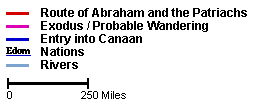 {Source: Dake's Annotated Reference Bible.} |
||||||||||||||||||||||||||||||||||||||||||||||||||||||||||||||||||||||||||||||||||||||||||
|
Scientifically-Archeology-Teaching’s web-page's throughout these web-site's!
This ministry; "God's Outreach Ministry Int. Inc."; Scientifically - Archeology - Teaching’s web-page's throughout several web-site's, with many of Scriptural Scientifically studies is always freely available for everyone! It is written in various fields of geography, archeology, ancient-history; Jewish Roots & Inheritance; and science in many web-pages!
That is the simple reality of the situation! Thank you for your understanding! There are still changes possible, but it will not change the original visions!
I would like to hear from you how G-d has touch you throughout this study;
Shalom
Rev. Paul van Beek |
||||||||||||||||||||||||||||||||||||||||||||||||||||||||||||||||||||||||||||||||||||||||||
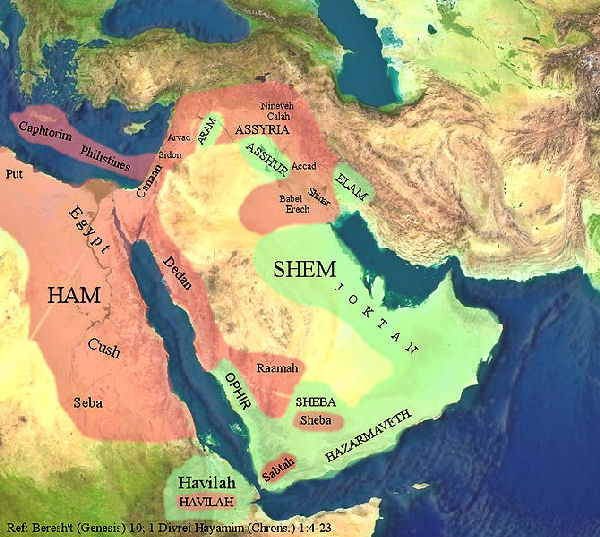
Middle eastern land distribution demonstrating the land of
Canaan governed by Cham |
||||||||||||||||||||||||||||||||||||||||||||||||||||||||||||||||||||||||||||||||||||||||||
|
The first house of worship built by Divine revelation for the true G-d was revealed to Moses and constructed by the Hebrews in the Sinai wilderness. Called the Tabernacle! This Godly inspired structure was created by men who were building on Earth what G-d has built in Heaven. It was a pattern of a Heavenly temple and a place where the High priest could communicate with G-d each year in the "Holy of Holies' on the day of Atonement. (Yon Kippur) |
|
|
Related & Important studies/research: We provide you this information, but you have to discern by the Spirit of God what is the truth! ...But it is very interesting to read! |
|
|
Book of Enoch (PDF-File) Online: http://www.sacred-texts.com/bib/boe/ |
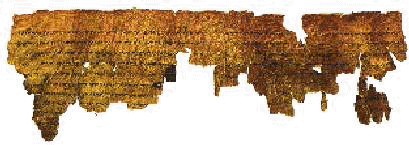 |
|
Book of Jasher Chapter 16 Online: |
The Books of Jasher are one of
the apocryphal. {Referred to in (Joshua
10:13 KJV)
"...And the sun
stood still, and
the moon stayed,
until the people
had avenged
themselves upon
their enemies.
Is not
this written in
the book of
Jasher?
So the sun stood
still in the
midst of Heaven,
and hasted not
to go down about
a whole day."
&
(2 Samuel 1:18 KJV)
"...Also
he bade them teach the children of Judah the use of the bow: behold,
it
is written in the book of Jasher."}
|
|
After Flood New World Order
- Generations Coming soon! |
Now it was
Nimrod
who excited them to such an affront and contempt
of G-d. He persuaded them not to ascribe it to
G-d, as if it was through his means they were
happy, but to believe that it was their own
courage which procured that happiness. He also
gradually changed the government into tyranny,
seeing no other way of turning men from the fear
of G-d, but to bring them into a constant
dependence on his power. He also said he would
be revenged on G-d, if he should have a mind to
drown the world again; for that he would build a
tower too high for the waters to be able to
reach! He would avenge himself on God for
destroying their forefathers!
The place wherein they built the tower is now
called Babylon,
because of the confusion of that language which
they readily understood before; for the Hebrews
mean by the word Babel, confusion.
Out of the Works of Flavius Josephus. Genesis 10 & 11 |
|
Noah's Flood!
Catastrophism |
Catastrophism such as the Noah's flood has been clearly and consistently associated with Biblical doctrines! The Scriptural Books of Genesis and Job are similarly found to be correct with respect to Earth history! The writings' on the Biblical Flood; this is why it is essential to understand the nature of the Flood, as well as the scope of the effects! |





This "Teaching & Information in the form of a
"Melchizedek;
Priest
of the most high G-d
and
King of Salem!"
A part also of:
“End
Time Harvest Revival / Science Noah's After
flood Generations"
Sripture
verses
out of the Dake's annotated Reference Bible (KGV) + Note's
Jewish Bible;
Hebrew Scriptures; Amplified Bible
Edited; Lay-Out & Graphic designed
by:
Paulus van Beek
![]() God’s
Outreach Ministry Int.
Inc. ©
God’s
Outreach Ministry Int.
Inc. ©
Also source partly out: (Bibliography)

SOURCE: Names of
"Jehovah" are replaced by the
Scriptural &
correct
Names: "YHVH"
{"Tetragrammaton"};
Yeshua
is the Jewish/Hebrew Name of "Jesus
Christ"
is added; Grammar
issues are removed so far as possible!
http://www.abu.nb.ca/Courses/NTIntro/Melch8.htm
Bridger, David. Ed.
The New Jewish Encyclopedia,
NY: Behrman House, 1976;
Navigating the Bible II
Dake's Annotated Reference Bible / Study notes
Also inspired by
Dominick Marotti; who started this study
(Age 86/2011)
http://en.wikipedia.org/wiki/Melchizedek
Matthew Henry
Concise Bible Commentary.
Source: from Book: "They came from Babel" by S.A.
Cranfill;
Study notes from Book "Mystery of the Priesthood
of the Blood" by Perry Stone Note's from
Pages159-169
Jewish Orthodox/
Chabad/ Rabbi Menachem Posner
Talmud,
Nedarim 32b.
Edited, Lay-out; research; & added
information; etc... by Paul van
Beek /
God's Outreach Ministry Int. Inc.;
Research Center
@
E-mail to the Editor/Web-designer for information
Contact us
for
information to the Editor/Web-designer
P. O. Box 93404; Lakeland; Florida; 33804-3404
'
(863) 660-2444
www.Godsoutreachministryint.org
www.Prophetoffice.org
www.Endtimeharvestrevival.org


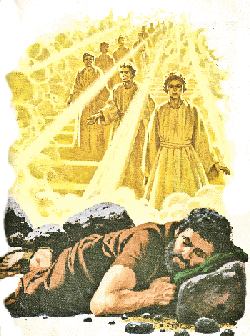
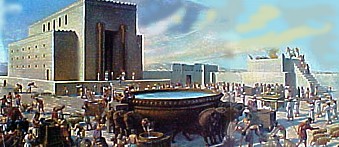
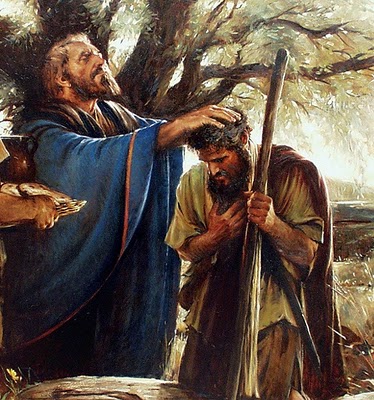
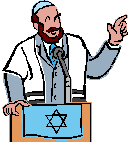
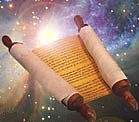
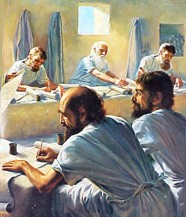 There are several (as many as five) separate works by this title,
all composed much later than Biblical times. This particular one is a
translation of a Hebrew book printed in 1613. Sepir Ha Yasher, the
Hebrew title of this book, means the 'Book of the Upright', or 'the
Upright or Correct Record'. This title was misread as 'Jasher', and at
some point Jasher was treated as a proper name; however the pronoun
'the' (Hebrew 'ha') never precedes proper names.
There are several (as many as five) separate works by this title,
all composed much later than Biblical times. This particular one is a
translation of a Hebrew book printed in 1613. Sepir Ha Yasher, the
Hebrew title of this book, means the 'Book of the Upright', or 'the
Upright or Correct Record'. This title was misread as 'Jasher', and at
some point Jasher was treated as a proper name; however the pronoun
'the' (Hebrew 'ha') never precedes proper names. 